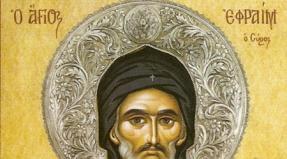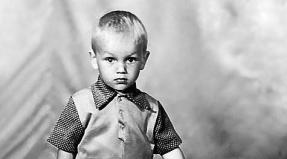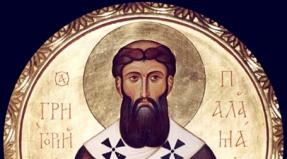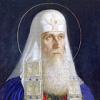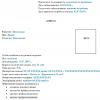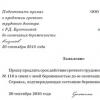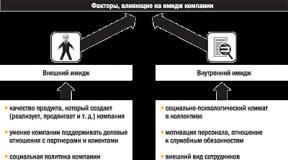Creations of the reverend father of our Nil of Sinai. Nil of Sinai, Venerable Exhortatory chapters
Our Reverend Father Nil ascetic, letters // Christian reading, published at the St. Petersburg Theological Academy. Part 1, St. Petersburg. 1845
Brief information about him
The Monk Nile came from a wealthy and noble family, and probably even then, as St. Chrysostom was a preacher in Antioch, he was a listener and his disciple. His noble birth and personal merit raised him to the rank of prefect of the capital. But the aspirations of his spirit did not agree with the proper troubles and orders of life in the capital. Why, having agreed with his wife, with whom he already had two children, he left the world, so that in solitude he would be more successful than his mother-in-law by way of salvation. He, taking with him the son of Theodul, settled in Sinai; and his wife and daughter found shelter for themselves in one of the Egyptian convents.
In the Sinai desert, the teacher. The Nile lived extremely strictly: with their own hands and their son they dug a cave for themselves and, living in it, ate not even bread, but wild bitter plants. All the same time passed with them in prayer, study of Scripture, Divine thinking and labors.
Leaving the world, however, the teacher. Neil did not leave communication with people. From all places and every kind of person turned to him with their spiritual needs, and no one was left without the necessary admonition and edification. And the king wrote to him, asking for prayers, and he wrote to the king, reproaching him for injustice to St. Chrysostom. Other writings of the monk are predominantly of moral and ascetic content. From everything he wrote, it is clear how extensive and deep his knowledge was, and how tireless his labor in this matter.
To test his love for God there was a special temptation for him. Wild barbarians from Arabia attacked Sinai and its surrounding areas, and they plundered everything, beat many, and took some into captivity. Among the latter was Theodulus, the son of St. Nile. This misfortune was very sensitive for the monk, and he could not find rest for himself, especially when on the second or third day after the general misfortune the news was brought to him that his son was sacrificed by the savages to the matinee, the star Venus, without claiming whether it had been fulfilled. there was such a definition. But not for long, God allowed his parental heart to languish. He soon learned that the sacrifice did not take place and the captives were sold out to Christian countries. Searches found him later in the city of Eluza, whose bishop bought him from the barbarians along with others, and was already preparing him for the ministry of the Church, to which he was begged and his father arrived for him. Their love of living in the wilderness did not allow them to agree to this; and the bishop, having ordained them as priests, blessed them to go to their beloved Sinai, where they stayed until the end of their lives.
Etc. The Nile left the world in 390; he lived in the Sinai desert for 60 years and died about 450. His memory is November 12 and January 13. His relics under Justin the Younger were transferred to Constantinople, and laid in the church of St. Apostles.
From the writings of St. Nile into Greek Philanthropy, and from it into Slavic, taken - the word about prayer and the word ascetic. A word about prayer we also take into our Philosophy; instead of the ascetic word, we prefer to take the word about eight spirits of guile, and two collections of summaries and instructions, of which one is entitled: - chapters or exhortations, - and the second: - thoughts that take a person away from the perishable and stick to the imperishable... - But how about prayer and about the struggle with passions, a lot of useful advice and instructions was expressed to the monk in his other writings, just as there are everywhere in abundance prescriptive thoughts and in general about the moral order and especially about life detached from everything: then thinking what was it would be unfair to deprive our Philosophy of these treasures, we decided to borrow them from the said scriptures of the monk, placing what relates to prayer, under the word about prayer, - what to struggle with passions, - under each of the eight passions, what - for general edification, - under the collection of sayings. We imitate the ancients in this. For the Patrol. graec. Migne t. 79, where all the writings of St. Nile, after thoughts that lead away from the perishable and stick to the imperishable, - pp. 1249-50, - a note was made that in the manuscript with which these thoughts were printed there follow another ten-four thoughts, borrowed from the word about non-acquisitiveness then from the article about superiority being in silence before life in the city. These borrowings themselves have not been published; but the example does not lose anything through this.
Quotations of these borrowings will mean at the end of the articles, indicating the volume and page - according to the publication of the saint's creations in Russian translation. Articles without citations are on the same page as above.
A native of Constantinople, he lived in the century and was a disciple of St. John Chrysostom. Having received an excellent education, Nile was appointed as a young man to the important post of prefect of the capital.
By this time, Neil was married and had two children. The splendor of court life weighed upon the spouses. Saint John Chrysostom exerted a tremendous influence on their lives and their aspirations. The couple decided to part ways and devote themselves to monastic life. The wife of the Nile with her daughter withdrew to one of the women's monasteries in Egypt, and the Monk Nile with their son Theodulus went to Sinai, where they settled in a cave dug out by their own hands.
For forty years this cave served as a dwelling place for the Monk Nile. By fasting, prayer, and labor, the saint attained high spiritual perfection. People of every rank and class began to come to him - from the emperor to the farmer, and everyone found advice and consolation from the saint. In his solitude, the Monk Nile wrote much. His messages are known, among which are the wrathful denunciations of the emperor Arcadius, who expelled Saint John Chrysostom. The ascetic creations of the Monk Nile, a worthy disciple of Chrysostom, are widely known: they are perfect in form, deeply Orthodox, filled with sincere feeling and clear thought.
In the wilderness, the Monk Nile endured many hardships. He survived and subsequently described the massacre of many Sinai monks by the pagans. At that time, the Saracens captured his son Theodulus, who was ordained as a sacrifice to the pagan gods. Through the prayers of the saint, the Lord saved Theodulus, and the monk found him with the bishop of Emesa, who had ransomed the young man from the barbarians. The same bishop ordained both hermits as presbyters. After consecration, they returned to Sinai, where they asceticised together until the death of the Monk Nile.
Prayer Words
Troparion, voice 8
Thou hast cultivated fruitless tears with the currents of the desert, / and others from the depths with sighs of a hundred labors fertile, / and you were a lamp to the universe, shining miracles, Nile, our Father, / pray to Christ God to save our souls.
Used materials
- Saint Herman Calendar 2009, 93.
- Portal calendar page Pravoslavie.Ru:
Date according to the German calendar for 2009.
Chapter 22... Remembrance for the spirits of fornication and vanity, these two evil demons, opposed to each other, for one runs around faces, and the other rejoices over faces. And the demon of lewdness, not tolerating the warmth of the fiery light-bearing of labor, quickly attacks the ascetic during the ascetic, suddenly showered him with impurities, and if he weakens in temperance from the seductiveness of pleasures, he gradually steps on him, talking with his heart, so that it becomes inflamed with vices. , gave himself up to this conversation, was captivated by it and completely put off the hatred of sin. The demon of vanity, who loves to wander and win the love of the people, secretly appears to the soul of hardworkers, for the very works in which they exercise, catching their glory. If anyone wants, with God's help, to overcome them, then let him exhaust the flesh against fornication and humble the soul against vanity. For in this way we will conveniently reflect the vain glory of one and please God with that, as well as evaporate in ourselves the unclean dreams of another and make our heart pure from voluptuousness. It is most dangerous if the heart is mired in the habit of pleasure; and it takes a lot of work to destroy everything to the root in this pasture of vices. Therefore, do not train the thought of entering an interview with pleasure, because in the host vices the fire is kindled(cf .: Psalm 105, 18).
They, heating you up, bring you to the conclusion that it is difficult to continue the burnt offering of nature, that life of abstinence and long-term patience is long-term, they bring to mind those shameful dreams that appear to you in a vision at night, forming fiery idols of delights in you, and then, igniting the strongest heat in the flesh by a sinful law, internally they instill that you are not able to do violence to nature and although you will sin this day out of need, but in the morning you will repent according to the commandment. For the law is philanthropic, it forgives the sin of those who repent. They present to you as an example that some, after abstinence, fell and repented again, in order to give the chance to their seductive advice and so that, crushing their souls with this reverse repentance, make the temple of chastity a house of fornication. So these bilingual serpents whistle this thought in the shaken temple of the heart.
Chapter 23... And you, a man of abstinence, under the pretext of repentance, do not flatter yourself again with unknown hopes. For many, having fallen, were immediately abducted by death, while others were unable to rebel, by the habit of pleasures bound like a law. Why do you, man, know whether you will be alive and whether you will repent that you are assigning years of life to yourself? And, falling here, you please your flesh, when you ought to surrender yourself more to the remembrance of death, so that in your heart you can vividly imagine the terrible judgment of judgment and thus extinguish the inflamed wisdom of the flesh. For you will not extinguish passions otherwise, if you do not mix with your flesh toils that crush passions. You will not quench the passions of the soul if you do not first wait on the heart of the fruits of love. The bodily passions originate from the natural needs of the flesh, and one must abstain from them. And the passions of the soul are generated from the needs of the soul, and love is needed against them. Love is a union of dispassion, the elimination of passions - it brings patience, cools seething irritability, instills humility, humiliates pride. Love has nothing of its own but God, because God is love. Whoever has recently joined the bright cathedral of monks, let him put aside the thoughts that bestow upon him good glory by his kinship, in order to demand him not praise from people, but satisfaction from the commandments. But let him arm himself with courage against the fearsome demons. For do not accept the spirit fear packs in fear(cf .: Rom. 8:15).
Yes, he does not frighten himself with the spirit of fear, and the night noise produced by demons does not tremble when they no longer have power over pigs. Therefore, leaving the cell late in the evening, may he not be terrified and may not rush to run back, as if from the attacking demons, but, kneeling in the place where he fell into fear, may he perform a prayer. For the demons will not attack you, although they will terrify you. And when you rise up, be of good heart, comfort yourself with psalmics, saying: Do not fear the fear of the night, from the arrow flying in days, from the thing in the darkness of the transitory, from the crumbling and the demon of midday(Psalm 90: 5 and 6). For, having done this once or more, you will soon drive away the spirit of fear from yourself. Not being able to harm the very deed, the demons frighten the soul with dreams, so that they, the weak and powerless, people would consider powerful and strong.
Chapter 24... Do not dress up in red clothes, so as not to clothe you even more clearly in the demon of vanity. For virtues are not adorned with the babbling of garments, but with the babble of the soul, as with gold, works shine. With the fear of God, cover yourself from the executions of judgment, so that, out of fear of fire, you can clothe you with inextinguishable fervor and sooner contrive against the evil-artistic nature of thoughts, because fear is the beginning of wisdom.
Whoever makes it possible to see the delusion of thoughts through experience will not be known by everyone, but only by those who have experienced it on themselves, because the path to knowledge in this is experience. The cause of both is active life; Having occupied ourselves with it with great diligence, we will recognize ourselves, and we will condemn our thoughts, and we will know God. He who anoints artless thoughts with an active transmigration and the cognitive instilling of thoughts with art, should be watched so as not to glorify knowledge for glory. If the thought, exalting them, acts predatory, then the ascetic will take the stranger Jethro to help him, who out of mercy gave the great prophet Moses wise advice about judgment. Let deeds be done by the power of your thoughts, because more wisdom is in what is done, and not in what is said, just as the former is more difficult than the latter; during activity, words seem to be lightning-fast, and when there are no deeds, words do not shine with the power of deeds. A reproach to gray hair - a young word and a long-winded mouth, twisted by laughter. He who both embarrasses and is embarrassed in vain is out of silence and overwhelmed without a storm.
Chapter 25... Do not force the tongue to untimely chase after words, so that you yourself do not suffer the same from anyone you do not want. Beware of stumbling over the tongue of your neighbor, so that you yourself may avoid the devil's stumbling. Beware of condemning your brother's fall, lest you lose compassion as a foreigner.
Whoever does not have kindness and love for his brother, can he be a member of Christ-bearing love? When your brother comes to you during your continuous fasting, do not give room to boredom because of thoughts that inspire you to break your silence, to stop fasting. They make you, looking at your brother, do not look at God Himself. Frequent supervision of the brethren will not be called a reason for embarrassment, but rather rivalry. Let us trust their rebellion against the hordes of the enemy. Thus, having united by the attachment of love, let us ward off vice from ourselves, and we will bring the works of our hands into the treasury of strange love. We will accept the brethren, not as showing mercy to them, but as paying due tribute, we will ask them to accept our treat, as Lot showed (see: Genesis 19, 1-3).
Others are strangely dignified and strangely extolled; and when a wanderer is called to them, they do not beg him at all, but the very word of the call is pronounced slowly, with arrogance; and if the wanderer refuses, they reprove him as an offender; therefore great arrogance is kindled from this. For thoughts, gouging the eye of the soul, blind us, so that we use the best of the commandments as badly as possible.
Chapter 26... When a thought keeps you from forcing a very brother to a meal, then he mocks you by the very fact that your tongue is not forced by the power of love. The thought inspires you, perhaps, that your brother is one of the wandering people and that, content with bread, he will leave, but it inspires him that he has not at all found love for strangers in you; because the thought, looking at the same thing both ways, puts its own in the heart of each, in order to suppress the love of strangeness in one, and to grow backbiting in the other. Abraham, sitting before the tabernacle, if he saw anyone passing by, received him by his deed. He offered a meal to those living in wickedness and, accepting the barbarians, was not deceived in the hope of receiving the Angels. The sweetness of strange love was known to all who, during their wanderings, found refuge with someone, when even an affectionate word makes the meal sweet to the heart. Therefore, with great diligence, let us adhere to the love of strangers, for the sake of our own benefit, in order to receive us not only Angels, but also God. For the Lord says: Ponezhe co-created for the one of these my lesser brethren, I co-created(Matthew 25:40).
One of those who practiced virtue with the greatest knowledge gave the following answer: "The demonic dreams echoing in the heart are usually destroyed by the carefulness of strange love and generous services rendered with diligence, if only in some way someone has freed himself from the material. If this is done with humility and with a contrite heart, it even more quickly relieves the sufferer of the dreams of them, because the demons are very afraid of humility, knowing that this is the Master's commandment. "
One of the noblest ones, speaking about humility, recounted the following: "A very good-natured father was struck on the demon-possessed devil, who was in great madness; and the father, immediately turning around, presented him with another deer with a readiness to take the blow. with a lightning of humility, crying out, he suddenly jumped away from his father. "
Chapter 27... These are the words of the holy bishop Epiphanius. “It happened,” he says, “that a son of a faithful widow had an inquiring demon in him; seizures lasted for a long time, and no benefits helped; when his mother came to humility from tears, her thanksgiving eased her suffering. When the young man wandered around the surrounding places, and the mother began to pray at home, the demon, loudly pronouncing her name, rushed about in agony. but, attracted by others, she was brought by force, and after that the demon with a fury began to indulge in flight.Therefore, without retreating and in tears embracing the boy, with thanksgiving and humility, she protected him from the demon, and when, having sobbed bitterly, brought prayer to Christ and applied the sign of the cross on the son, the demon immediately left the lad. " With hatred, demons look at those who shine with submission to their father, and grind their teeth at them, because, living in submission, they carelessly coupled with this and renunciation of the world. For them, carefully looking for pretexts, the demons of grief are preparing, when they encounter a reason, they root indignation in them for anger, and then they gradually lead to inflammation and hatred of the father for the fact that he allegedly punishes unjustly and is partiality; the demons do this in order to shake the soul in various ways, to abduct it from the fatherly embrace.
Therefore, whoever is subordinate to his father, let him give himself up to grievances and conquer them with humility, let him be governed by long-suffering and do not heed the thoughts that murmur at the severity and insolence of the brethren.
Chapter 28... Most of all, the demons inspire that freedom cannot be associated with heavy slavery, they even extend beyond this, so that, having made the subject rebellious, it is more convenient to immerse him in the material. And they try to separate some from their fatherly care, and others in other ways, internally repeating to them: "Work, acquire, accept strange ones in order to create a good name for yourself."
For with good seeds they all in parts and bad tares and at first allow a person to enjoy vanity, sober up in constant fasting, zealously rise up for prayers and church services, so that he could conclude from this that, remaining subservient, he would not have become so: because there and insults, and sorrows, and embarrassment, but here is peace, silence, joy; there is the severity of the father, fear, numbness, and here there is carelessness, fearlessness, unrestrainedness. So the demons, having deceived such thoughts of this kind, steal the mind from a person. Suddenly attacking the soul during a long sleep, they fill it with fear, interrupt the Divine services with negligence and despondency, suggest that hospitality upsets a person, use all the charms of vice, so that, plunging it into despondency, arouse hatred for life itself , and thus, stripping from the virtues, submit to the shame of the Angels.
Sometimes demons exalt works in thoughts, and sometimes they humiliate them as if they were not serving anything, in order to instill high-mindedness in one case, and in another to sow despair. In those who cannot be brought to relaxation, labors are magnified in order to instill in them high-mindedness, and for those who do not agree to indulge in high-mindedness, they reiterate one thing that labors do not serve anything, so that, by bringing them into relaxation, all of them despair.
Chapter 29... Therefore, when thoughts magnify labors, rejecting them with contempt, we will humiliate the soul, and also, when labors diminish as if they do nothing for anything, how much strength we will magnify Christ's mercy. For, to the extent that you depress your body more and more, test your conscience in the same way. Get to know yourself, feeling the secret plundering of thoughts, so that, while remaining insensitive to their secret robberies, we do not come into the overshadowing of the thought that virtues are being reaped by the severity of life alone.
Some, having dreamed this, like prugi, hesitated in their minds, because demons produce ghosts, seduce with visions, and sometimes plunder the soul of fear. To one of the brothers, who was awake at night, the demons presented terrible dreams, imprinting not only on the outer eye, but also in the inner vision. Therefore, the mind, struggling with concern for another coming night, came in danger of being plundered of thoughts, and abuse befell the soul for many nights. But the needy man tried to keep the leader of thoughts inside himself and, having betrayed his soul to the Giver of the soul, reproaching himself for his actual failures, he struggled to go deeper into himself; then, occupying the soul with thoughts of fire at the Judgment, he brought it into fear, so that, striking fear with fear, reflect the fear from himself. This happened, as the one who endured this battle said.
For when the demons in every way frightened the soul, the suffering person sought God in prayer; they entertained the soul with dreams, and he, having collected the burden of the falls, revealed it to the Omniscient God; they again entertained the eye of prayer, and he, rewarding this with the fear of the Judgment, destroyed the dreamy fear and, as one fear abounded before another, with God's help he conquered deception, because the soul, humbled by the remembrance of sins and awakened by the fear of the Judgment, vomited demonic horrors from itself ... Yet this: both the driving away of demonic horrors, and the reinforcement of the falling soul - was accomplished by grace from above, because the Lord strengthens all those who fall and erects all the overthrown(cf .: Psalm 145: 8).
Chapter 30... Sometimes we strive to create pure prayer, and yet we cannot; and sometimes we also do not compel ourselves, and the soul abides in pure prayer: the first comes from our weakness, and the last from grace from above, calling us to enter into spiritual purity, which together teaches us not to ascribe to ourselves, if we pray purely, but to acknowledge the Giver of this. We will pray for the sake of it, as it befits, we can't(Rom. 8:26). When we strive to make prayer pure and we cannot, but we are darkened, then, having wetted the little flowers with tears, let us pray to God to scatter the night of battle and shine light in our souls.
When your brother living with you leaves for service, according to the prayer custom, renew your memory of him, but do not dream of him beyond measure, so that the demons, having borrowed the beginning of caring from you and encouraging it, do not refine more and more, vividly presenting to you brother during psalmics and depriving God of God's care, so that, with one care reflecting the other, like captives, take us away from the best and from thinking about what has been said: Throw up your sorrow on the Lord(Ps. 54, 23). For the demons know that, due to excessive concern for our brother, having disturbed the sovereign in us, they will give the wrong direction of sorrow itself, and they will also extract from us and reproach our brother for being slow, as if he who had gone to the point of zeal for the work of service had taken care of his brother, and they do this so that our much caring love has changed even into hatred.
With our concerns about the absent demons, it is customary to do what on the very day on which, as they know, the absent one will arrive, as they show us in a dream in a mirror, so that after a dream come true and during the absence of others, make us again expect the prophetic dreams, which should be more averted and very much avoided, so that the demons do not mislead the soul with them in the reasoning of anything else.
Chapter 31... For they know nothing in advance, but what they see accomplished, they show and represent in a dream. Often, when we were in silence, the demons, seeing a brother walking towards us, indicated him in thoughts in advance; and they do not need to believe, although apparently they are telling the truth, because with the very truth they bring in a lie, so that on this particular occasion and on the routes that lie ahead of us, they can determine the places of ambushes. Just as the gold that was not used in the business, put into the smelting furnace, becomes cleaner, so the newly arrived monk, having melted his morals in the monastery, is distinguished by patience. For under the order of the brethren, he completes his training in obedience, and under the right hand of the punishing one prepares nature for longsuffering. Therefore, when he joyfully accepts insults and loves humility with self-humiliation, then, having risen above the opposite passions, he then begins to ascend in order to prosper in virtues to the extent of the more and more powers bestowed on him by grace. As those descending to the foundations of the earth pull out gold there, so those descending to a golden-like humility will wear away the virtues from it. Then the mind will feel peace, when, having cut off the causes of the passions, it engages in contemplation, and before the passions are cut off, it feels both labor and its own curse, proceeding with weakness to fight the resistance.
Chapter 32... Hermitage, when gradualism is observed in it, is readily accepted by the elders, if only someone passes on to this, having perfected in virtues while still in the community. And let him test himself as such, whether he can succeed in hermitage. And if, finding this impossible, he weakens in virtue, then let him return to the community, so that otherwise, not having the strength to resist the tricks of thoughts, he does not lose his reason. Just as sons serve as comforters for a weeping widow, so a fallen soul is consolation - works: they dispel the despair of thoughts and sow faith in repentance, proclaim Christ's mercy and pronounce the sins committed.
Therefore, we must not only engage in labor according to custom, but with the understanding of thanksgiving, so that the soul does not become devoid of such wisdom. For if in every deed we comprehend the Giver of labors, then we seal the deed with thanksgiving. As a young dog tries to take away bread from a baby, so understanding in the heart is a crafty thought. Therefore, we will not look at the cunning of disgusting deeds as babies, so as not to betray our souls to them for plunder. As a shining host of stars paints the sky, so the shining truth of words adorns a person. Therefore, let us bear on our tongue one image of truth, for the Lord instills like-mindedness in the house(Psalm 67: 7).
As strong lightning, rushing, foreshadow thunder, so accurate speech, when uttered, foreshadows faith. Therefore, let us try to be faithful to the truth in order to draw closer to us and to the throne city of virtues - love. As the sun smiles with golden rays on the whole earth, so love greets every soul with its radiant deeds. If we acquire it, then we will quench our passions and shine to heaven. We accomplish any work, as soon as we seize holy love, because without it there is no use in anything present, and anger grows ferocious, and morals grow coarse, and glory is mingled with works of arrogance. Out of the humility of his soul, David fasted with tears; and we will humble the soul by fasting.
Chapter 33... He who strives in the most difficult bodily labors, let him work not for praise and not be exalted in glory. For the demons mock the soul with these labors and the severity and feat of the body strengthen with glory, entice to take on even greater labors so that a person becomes even more exalted, they conduct an inner conversation with him, inspiring him through thoughts: and such and such has acquired a great name for himself, so they speak of him even after his death, so you also ascend to the very height of asceticism in order to acquire glory for yourself and so that your name may become great and after your death it will be pronounced with special praise. "
By means of these, to such an extent deceived, thoughts, not only by bodily labor, they fight with you, but they call you more for assistance, so that through them they touch the soul in something more dangerous, for they elevate a person to primacy, elevate him to the right to speak as a teacher. so that for this rumor would give him primacy both in great works and in knowledge. They put in it competition and envy for those whose success is glorified, the activity is worthy of surprise, and close to it is knowledge. Sometimes the incitement of the flesh is lulled in him, with a cunning intention they do not give room for unclean thoughts in the interior, so that a person thinks that the spirit of fornication is overcome by the severity of his life, his heart is close to the lordship of the saints and he ascended to the very top of holiness.
And in the reasoning of food, from which he abstained, and constant fasts determine for him the years, after which he has the right to boast as a valiant one, and to be exalted before the brotherhood, as something low in comparison with him; and in this way they force him to talk about his exploits, in which he supposedly succeeded only by his own strength, because he did this and that, he struggled and suffered so and so, not in the least allowing him to say at the same time: the help that worked in me. " For they do not allow him to confess God as a helper in what they force him to boast of, so that, since he accomplished everything in his exploits with his own strength, he completely demanded praise as a reward for himself, and through this he was mired in the depths of blasphemy, meaninglessly glorifying that he was himself. assistant.
Chapter 34... Therefore, when the heart is so strongly filled with the glory of thoughts and does not oppose it, then it is not beyond the secret stupidity of meaning, and the leader of the mind is in danger of coming into hesitation either from dreams received with faith, or from transformations taking place in a waking state, or from visible in the transformation of light. For this is how Satan is transformed into an Angel of light for our deception, sometimes he shows that he gives gifts so that you fall and worship him, or announces that they will rapture you like a new Elijah, or promises to make you holy. Others, having accepted this with faith, deviated from the truth and fell into mental damage.
Therefore, you, the prayer book of the Holy Trinity, knowing what you are working on with love, watch your heart in every way, so that, paying attention to some external labors, you will not be cunningly caught in your internal labors. So, my word has been told to you, child, but what I have spoken, let your heart watch over it. Remember Christ protecting you; do not forget the venerable and Consubstantial Trinity, to the glory of the Father and the Son and the Holy Spirit, now and always and forever and ever. Amen.
The editors of the Pravoslavie.Ru website present to the readers' attention, for the first time, the work of Professor of the Theological Faculty of the University of Belgrade Vikentij Fradinski - a study on the life and teachings of the Reverend Nile of Sinai, translated into Russian. The author, who emigrated from Russia after the October Revolution, wrote this work in the 1930s in Serbia.
Foreword
Life and works of St. Nile, the ascetic of Sinai, belong to the second half of the 4th and the beginning of the 5th century, that is, that era of Christianity, which, according to the number and glory of the teachers of the Church, is justly called the "golden age of Christian enlightenment."
Studying this era, scientists, which is very natural, turned primarily to the greatest hierarchs of that time: Basil the Great, Gregory the Theologian, Gregory of Nyssa, John Chrysostom, Jerome of Stridon, Ambrose of Mediolana (Milan) and Augustine of Ippons.
Alongside these great beacons of Christian enlightenment, St. The Neal, at first glance, occupies a modest place. Shielded by the shadow of famous contemporaries, his personality remains a little aloof, and therefore learned theologians paid much less attention to him.
Until 1915, there was not a single monograph devoted to the life and teachings of this great teacher of the Church, especially famous as the spiritual leader of the monks. And only in modern times there have appeared two works in German: 1) the Catholic work of Dr. Fr. Degenhart “Der hl. Nilus Sinaita. Sein Leben und seine Lehre vom Moenchtum ". (Beitraege zur Geschichte des alten Moenchtum und des Benediktinerordens. 6. Heft), Muenster in Westf., 1915; 2) the Protestant work of K. Heussi "Untersuchungen zu Nilus dem Asketen". (Texte und Untersuchungen. 42. Band. Heft 2), Leipzig, 1917.
In Orthodox theological literature, to this day, not a single work has appeared with a systematic presentation of the moral and ascetic teaching of St. Nile of Sinai.
In patrological and ascetic collections we find brief information about his life, as well as individual fragments from his treatises and letters, however, they are presented without a strictly defined plan and do not give a clear and complete picture of the moral and ascetic teaching of this holy father.
If our modest work could at least partially fill this gap in Orthodox theological literature, then we will consider the goal set by us achieved.
In this work, we, to a large extent, were inspired by the following advice from St. Nile: "Let theologians investigate the lives of the saints and the virtues of those people who have withdrawn from the world and tried to hide, and let them study the beauty that they stand out for - in order to imitate their way of life."
Chapter 1
Life of the prep. Nile of Sinai
Data on the life of St. Nile of Sinai are very scarce. His traditional biography is based on the brief notes of the monk George, known as Amartol (mid-9th century), George Kedrin (12th century) and on a slightly more extensive exposition in the Constantinople Synaxar (under November 12 and January 14) and in the "Church history" of Nicephorus Callista (XIV century).
However, the main source of the life of St. Nile is his own story about the murder of Sinai monks - "The Legend of the Beating of Monks on Mount Sinai and the Capture of Theodulus, the Son of Nilov", known in literature as "Narrationes".
Place of birth of St. The Nile can be identified from his (?) Letter to Iliodor and "Praise to Albian". It is in the letter to Iliodorus, which speaks of the monks living in Sinai, that it is also indicated that among them there is a certain Galatian by origin, who, together with his son, has been carrying the feat of fasting for many years. The following is a description of the sudden attack of the barbarians on the Sinai monks and the capture of the son of the aforementioned elder. However, the young man, through the intercession of the martyr Plato, is miraculously saved and returns to his elder father.
This letter, which tells of the miraculous rescue of a young man from barbaric captivity and his return to his grieving father, undoubtedly refers to the same event that is described in detail in the Narrationes, and on this basis we can assume that it speaks about the reverend Nile. The whole narrative is in general agreement with the "Narrationes", and therefore Tillemont, Ceiller, Kunze, Bardenhewer, Degenhart and others consider the birthplace of St. Neela Galatia. The praiseworthy word to Albian makes it possible to determine the city in which he was born, that is, Ankyra, because St. Neil tells of Albian that he is from Galatia and a pet of the city of Ankyra. Further, it is said that he came to familiarize himself with the fasting of the monks who passed we have feat of fasting: "with us" - that is, "outside the city, on the mountain." Thus, about the city of Ankira, the birthplace of Albian, St. The Nile speaks as of his hometown, which gives the right to consider Ancyra Galatian as the birthplace of St. Nile.
K. Heussi mentions one manuscript of the 10th century, in which the works of St. Nile have the title "The Book of St. Nile of the Ascetic from Ankyra Galatian: Letters". This title, as well as the extensive treatise of St. Nile "To the most venerable Magna, deaconess of Ankyra, the word of non-covetousness" confirm the assumption that St. The Nile was born in Galatian Ankyra and that Ankyra was the place with which, as with the place of his birth, St. Neil was in constant touch.
Although Nicephorus Callistus in his "Church History" clearly says that St. Nil of Sinai was born in Constantinople, yet his opinion cannot be confirmed by any evidence and, as we have seen, is in contradiction with certain passages from the works of St. Nile. Therefore, leaving aside the statement of Nicephorus Callistus as evidence flowing from a writer of a later time (XIV century) and therefore "unauthorized", we agree with the opinion of the majority of scholars who consider the birthplace of St. Nile Ankyra Galatian.
Unfortunately, we do not have accurate data on the basis of which we could determine the time of birth, labors and death of St. Nile. Any chronological calculations associated with his life are only approximate. In his writings, we find memories of persons and events that show us the way to chronological research, namely: in the works of St. Nile tells about the attack of the barbarians on the Sinai monks, dating back to the beginning of the 5th century; the emperor Arkady (395–408) is mentioned, to whom two letters are addressed; one of these letters, which tells about the expulsion of St. John Chrysostom, speaks of the earthquake that took place in Constantinople, while the other contains a reproach to the aforementioned emperor for the unjustified expulsion of the hierarch of Byzantium John. In addition, a letter to Diocletian (Diocletian) also points to the end of the 4th century, since it mentions that Diocletian saw with his own eyes the already aged heretic Apollinarius, and, as you know, Apollinarius died around 390.
All this information is indisputable proof that the activities of St. The Nile dates back to the end of the 4th - beginning of the 5th centuries.
The starting point in determining the date of his birth is the barbarian attack on Sinai, which, we will assume, took place in 410.
About the years of old age St. Nile we find evidence in the "Narrationes", namely: in the VI chapter, St. Neil speaks of his senile exhaustion, and elsewhere his son Theodulus calls him "an old father."
This suggests that during the attack of the barbarians, St. Neil was about 60 years old. This means that the date of his birth can be attributed to somewhere in the year 350.
Regarding the origin of St. Nile, we have direct evidence of Nicephorus Callistus, who writes that, due to his high origin, St. Neil was the prefect of Constantinople. That the reverend. Neil really came from a wealthy family, apparently from "Narrationes", where he himself says that the love of solitude won everything in him and forced him to leave home, fatherland, relatives, friends, household and estate.
We do not have any information about whether the parents of Rev. Nile Christians or pagans, and also where St. Nile was baptized and how his youth proceeded.
From the already mentioned testimonies of the monk George Amartolus, George Kedrin and Nikifor Callistus, it is obvious that St. Nilus of Sinai was one of the closest disciples of St. John Chrysostom. However, a direct indication of this in the writings of St. We won't meet Neal. And nevertheless, from his bold letters sent to the emperor Arkady, in which he defends the persecuted saint, it is clearly seen that St. The Nile was one of the devoted and ardent admirers of St. John Chrysostom. Honoring Saint Chrysostom in them, he calls him "the pillar of the Church," "the light of truth," "the trumpet of Christ."
In the writings of St. Nile, the literary influence of St. John Chrysostom. In addition to the two letters testifying to this, there are a number of others, which, as Haidacher proved, bear the imprints of the influence of St. John Chrysostom. In addition to literary influence, indisputably confirming the knowledge of St. Nile of the works of St. John Chrysostom, there is evidence that suggests that St. Nile was personally acquainted with St. John Chrysostom and used his advice and teachings.
The basis for this assumption, according to Kunze and Degenhart, is given to us by St. Neal in his work "On various evil thoughts", where he claims that he had the intention to tell more extensively that demons do not know human thoughts, but guess about them by our body movements; however, the "holy priest" turned him away from the fulfillment of this plan. But this "holy priest" is none other than St. John Chrysostom, because in many places where it is directly spoken of Saint Chrysostom, similar epithets are adopted for him. So, for example, in a letter to the Eparch of the North, St. The Nile calls St. John Chrysostom as a "heavenly man", "an inspired man", a "holy man", and in a letter to Bishop Anastassy - a "wondrous priest", etc. Therefore, we can rightfully, together with Kunze and Degenhart, conclude that under "Holy priest" hides St. John Chrysostom, and thus confirms the direct personal acquaintance of St. Nile with Saint Chrysostom. In addition, the audacious letters of St. Nile in defense of the persecuted St. Chrysostom and the frank, without any fear, denunciation of his enemies, including even the emperor himself, become more understandable for us if they trace their origin from one of the close and devoted disciples to their teacher.
So, the testimony of the monk George Amartola, George Kedrin and Nicephorus Callistus that St. Nil was a disciple of St. John Chrysostom, possess high degree probabilities. If the reverend. Neil was one of the closest disciples of Saint Chrysostom, then the question arises, at what period of his life and where their meetings took place. Since St. John Chrysostom first appears in Constantinople in 398, that is, at the time when St. The Nile was already in Sinai, then their personal acquaintance could have taken place in an earlier period in the life of St. Nile, when Saint Chrysostom was in Antioch. It was here that St. Nile from Ankyra to listen to the sermons of St. John Chrysostom and strengthened under his direct spiritual guidance.
Something more can be assumed, that is, that St. The Nile received an excellent education in Antioch, which at that time was one of the main cultural centers. And although he himself in many places speaks of pagan wisdom with vivid contempt, equating it with "rubbish", classical education. "A negative attitude towards Hellenic wisdom," says J. Stieglmeier, "did not prevent him from introducing various material from pagan literature into his spiritual teachings." At the same time, "he shows the knowledge of ancient pagan writers even higher than usual."
As for the social position occupied by St. Nile before accepting monasticism, then we find information about this in the Constantinople Synaxar, in other Greek synaxaries and monastic passages, as well as in the "Church History" of Nicephorus Callistus. All these sources say that St. The Nile, coming from a well-known family, held a high social position, as he was “the diocese of the city of Constantinople”. That the reverend. The Nile, indeed, was well aware of the "brilliance of worldly glory", as can be seen from a short letter to the bishop Bacchus, in which he, probably, on the basis of personal experience warns Bacchus about possible disappointment, since "the closer he is to the royal chambers, the more hefty worries and storms await him."
As for the family life of St. Nile before taking monasticism, then about her we have the testimony of St. Neela in his Narrationes, where he recounts his life story. From it we learn that St. Neil was married and had two sons. However, his love for solitude, gradually growing and strengthening in him from his youth, made him leave not only a brilliant social position, but also a happy family life. This touching scene of the termination of marriage life is described in sufficient detail by St. Nile.
When he had already decided to leave the world, he took his two sons, brought them to his mother and here, giving her the younger, and the elder, that is, Feodulus, leaving for himself, informed his wife of his intention.
Moreover, he announced this in such a tone that his wife immediately felt that his decision was irrevocable; and, on the one hand, obeying the inevitable, and on the other, having before her eyes eternal blessings awaiting the Nile for this sacrifice, she gave her consent to this, although parting with her husband and son caused her great sorrow and tears.
The reason that prompted St. Nile leave the world, his wife and children, we learn from him. He says: “For any intelligent creation, I consider it more appropriate not to indulge in excessive pleasures and not abuse legal permission, but to limit myself to this as soon as possible? Otherwise, when at last the strength will weaken, the desires will fade away and the senile pacification will come by itself, the success in chastity will be attributed not to efforts, but only to the necessity that comes in old age? A wrestler cannot boast of victory and the fact that he did not fall if he did not have someone to fight with. But - honor to the ascetic, if in the blossom of youth, in the flame of lusts, in the fire of passions, his mind triumphs over desires and suppresses in itself a strong desire for marriage, although it is legal, thereby confirming that he has perfect power over himself ".
Consequently, the reason that prompted St. Nile to leave the world and people, purely ascetic, that is, we are talking about a strong desire to acquire eternal blessings through self-denial during the heyday of bodily powers.
What year is the Rev. Neal left mhrrrr and took monasticism, we cannot determine exactly, but there is evidence to calculate this approximately.
On the one hand, the fact that he was already married and had two sons, and on the other, his own confession that he left the world "in the color of youth, in the flame of lusts, in the fire of passions" gave rise to Fessler, Schwitz, Degenhart and others make the assumption that St. Neil left the world at the age of about 40, that is, about 390, since we took 350 as the year of birth.
We can derive the image of his residence in Sinai from "Narrationes", where he describes in detail and with love the exploits and virtuous life of the Sinai monks. From his narration it becomes clear to us that the Sinai monks lived either in separate cells, or in dugouts and caves. Their cells were separated from one another by about 20 stadia. This remoteness of cells was not a consequence of hatred of people, but only a desire to talk with God in complete silence, since the noise of the environment distracts thoughts from the necessary intense attention.
On Sundays, the monks gathered in the church, where they offered conciliar prayers, received the Holy Mysteries and spent time in mutual conversations and reading, and were also strengthened by the moral teachings of more experienced monks.
The oldest ascetics set forth teachings on how to avoid popularity and pride, which in desert life are "pitfalls lying near the pier."
In the relationship of the monks, perfect love reigned. Each of them tried to deliver everything needed to the other. They did not know how to buy and sell, for they did not have any "Caesarean gold", but exchanged vegetables and fruits, mutually giving one to the other with every generosity from whoever had what.
The food of the Sinai monks was very meager: usually it consisted of vegetables and fruits, but bread was an exception, since only a small number of monks with great difficulty cultivated the barren land.
Some of the monks ate every other day, others twice a week, and still others only on Sundays.
In general, the monks, so as not to “waste a lot of time in serving the flesh,” cared little about food, but for the most part “served God with a pure mind, without burdening thoughts with saturating the body and not pleasing the voluptuousness of the womb.”
Such was the residence of St. Nile, who, leaving his "homeland, friends and property" and becoming a hermit, led a life of painful toil and deeds.
“For a long time,” he says, “this desert gave me the opportunity to spend my life pleasantly, enjoying great silence and, with a favorable wind, heading towards my goal.”
However, this peaceful life was destined to be interrupted: St. Neal was tempted very hard.
One Sunday morning all the monks, and with them St. Neil and his son Theodulus, according to custom, gathered in the church for divine services. But as soon as they performed the divine service, suddenly, like a whirlwind, the barbarians attacked them. They burst in, "like mad dogs," and first rushed to plunder the dry fruits prepared by the monks for the winter, and then they took the monks out of the church and began to chop them down with sabers. First they pierced the “priest of the holy place” with sabers, then “the elder who was with him,” and finally the youth who served them.
After that, one part of the monks was captured by the barbarians, and the others were forced to flee, "giving a sign with their hands." Among the latter was St. Neil, while his son Theodulus was among the captives.
Touchingly describes St. Neal his separation from his son. Tied to his son by tender love, he did not even think about his own salvation and did not have the strength to leave, but "silently" remained in place. Prompted by the son, who gave him signs with his eyes, he after all moved from his place and went after the remaining monks, who were heading up the mountain. “My feet,” says St. Neil, - moved forward after them, I do not know how the body followed them, but my heart did not want to go and forced me to often turn to my son. So, following those in front, I came to the mountain and from a height I watched how my unfortunate son was being taken away and how he was stealthily? throws his gaze on me. " After the barbarians withdrew, St. Nile, together with the remaining monks, descends from the mountain at night and buries the bodies of the holy martyrs, and then, in search of his son, leaves for Paran. Here he receives the first news about the fate of his son: one young man who escaped from barbarian captivity came to Paran and told St. Nil that the barbarians decided to sacrifice him and Theodula the next morning as a sacrifice to the dawn. With this intention, they already made an altar and laid firewood, without saying anything to the condemned. The fled, having learned from one of the captives, who understood the barbarian language, about their intention, immediately reported this to Theodul, urging him to flee together. However, Theodulus rejected the young man's offer, saying, "that it is impossible to escape from the will of God, whatever they may be, even if you retired to the most impregnable fortress." Thus, Theodulus, doomed to death, remained, while the young man who told about all this, taking advantage of the darkness of the night, fled. The news of the terrible danger that threatened Theodulus was aggravated by the grief of St. Neela, and he, having lost his composure, was about to fall into complete despair. However, he was encouraged by the behavior of one woman, who was no less depressed than St. Nila, for she received news of the death of her son, who was killed by the same barbarians. And yet this grief did not deprive her of her courage. On the contrary, having learned that her son had been killed and that he bravely fought against bloodthirsty villains, she put on white clothes and with a cheerful expression on her face offered God prayers of thanksgiving for the fact that He deigned to take into His hands the pure soul of her son This woman showed great strength of spirit, affirmed on a living faith in God and on boundless devotion to God's Providence.
The mood of a pious woman was also transmitted to St. Neal, so that "he felt ashamed for the little cowardice that he succumbed to, grieving for his son."
And from that moment he already courageously endures this temptation, completely surrendering to the will of God; he seems to forget about his unhappiness and, together with other monks, leaves to bury the brethren, who were killed by the same barbarians in the vicinity of Faran. Meanwhile, the inhabitants of Paran, after this attack, sent two envoys to the barbarian king with a complaint. When is Rev. The Nile, having paid the last debt to the dead brothers, came to Paran, the envoys had already returned from the barbarian king, carrying with them written promises of peace and an invitation so that all the victims and those whose relatives were taken into slavery would come to the king. At the same time, the king promised that he would punish the guilty and return the stolen property. Having heard such auspicious news from the messengers, the Farans sent a new embassy, supplying it with rich gifts for the king. Among those sent was St. Nile.
To the place where King Ammon lived, it took 12 days to walk through the waterless desert. When all the supplies of water taken with them were depleted, the members of the embassy, exhausted by intense thirst, on the eighth day of their journey dispersed in different directions in search of a source of water. Rev. The Nile, having separated from the others, climbed one mound and noticed a stream not far off, around which a large detachment of barbarians camped.
Those, as soon as they noticed Rev. Neal, they pounced on him, grabbed him, “tied him up and carried him away. Neal calmly surrendered himself to the barbarians. " “I,” he says, “who were knitted, torn, dragged, did not pay attention to it and, being tormented, did not know what they were doing to me; was my whole mind occupied with the thought of looking for my son? Either I will find him with them and then I will willingly remain with him in slavery, in order to enjoy his contemplation, or I will be killed, and this will serve as the end of my misfortunes. " Meanwhile, while the attention of the barbarians was absorbed by St. Neil, an armed embassy appeared on the hill; his unexpected appearance so amazed the barbarians that they, seized with fear, fled, leaving St. Nile and a large amount of loot. After resting at the source and quenching their thirst, the messengers continued their journey the next day and four days later arrived safely at the barbarian king.
Here St. Neal was "swornly" assured that his son had not died and that he had been sold to someone in Elusa.
Rev. Neil immediately leaves for Elusa with two guides. On the way, he meets a young man who tells him the good news that his son Theodul is really alive and that everything is very good with him, because one priest bought him. Arriving in Elusa, St. Nile goes first to the temple of God to offer a prayer of thanksgiving to God, and then goes to the bishop, where his touching meeting with his beloved son takes place. After silent hugs and tears of joy, Theodulus told the story of his salvation. From it we learn that the barbarians did not sacrifice in the morning dawn only because they slept at the appointed time; then they sold it to a peasant in Subait, and that one to the Elusian bishop. After hearing the story of his son, St. Neal confessed to him that during his grief he had made a vow to God: if his son survived, he would lead an even more temperate and strict life. In response, Theodulus exclaimed that he too would be very willing to participate in the fulfillment of this vow and to ascetic along with it, for he considers himself abundantly filled with the mercy of God. The Elusian bishop did not interfere with their fulfillment of their intentions and generously dismissed them, having first ordained them to the priesthood as a reward for their labors and deeds.
Having received the blessing from the bishop, the father and son return to Sinai, where they spend time in labors and exploits until the end of their lives. About the year of the death of St. Nile, we do not have accurate data, but we can assume that St. Nile died around 430, that is, in the era preceding the Third Ecumenical Council, because in his writings he unequivocally condemns the Nestorian delusions that had already appeared by that time. Memory of St. Nile's Orthodox Church glorified on November 12, and in the Roman Catholic - on January 12.
In the Constantinople Synaxar, in the meseeslov, as well as in Nicephorus Callistus, we find evidence that during the reign of Emperor Justin II (565-578) the relics of St. Nile and other Sinai ascetics were transferred to Constantinople and laid under the altar of the church of the holy apostles Peter and Paul.
The Glasnik of the Orthodox Church, Belgrade, 1906 (pp. 197–214 and 315–325) published a study by V. Boshniakovich “The Nile of Sinai”, which, unfortunately, never came out in full. Only the introduction was printed.
See "Chronicle of George Amertol", book. IV, ch. 202 (Migne Patrol. Gr. S., T. 110, col. 733 (17). This short note says that St. Nilus of Sinai, along with Proclus, Palladius, Vrison, Theodoret, Mark and Isidore Pelusiot, was a disciple St. John Chrysostom.
George Kedrin, in his Historiarum Compendium, literally repeats the expression of George Amartol, whose works he apparently used (Migne Patrol. Gr. S., T. 121, col. 632 B).
The text of the synaxarum was compiled in the second half of the 9th or the beginning of the 10th century. It was published by H. Delehaye. Propylaeum ad acta Sanctorum. Novembris. Synaxarium ecclesiae Constantinopolitanae. Bruxellis, 1902, p. 217.
In the "Ecclesiastical History" of Nicephorus Callistus we find references to St. Nile in three places: two times there are testimonies that the famous ascetic Nil was a contemporary of St. Euthymius (476-573) and St. Simeon the Stylite (beginning of the 5th century) and together with St. Isidore, Mark and Theodoret was a disciple of St. John Chrysostom (see: Migne Patrol. Gr. S., T. 146, Histor. Eccles., Lib. XIV, cap. 30, col. 1156 D and 1157 A and cap. 53 , col. 1249 D – 1252 A), as well as more extensive information about him in Ch. 54, book. XIV (ibid., Col. 1256 AB).
In the account of events in this letter, there are still certain features that distinguish it from the narration in the "Narrationes". So, for example, here the son is saved from slavery, using the miraculous help of the holy martyr Plato, and returns to his father on horseback. In Narrationes, the father himself, after a long and tiring journey, finds his son in Elusa, in the bishop's house ... For us, this letter is very important, since, along with the Praise for Albian, it makes it possible to draw a conclusion about the place of birth Rev. Neela: the author of this letter, whoever he is, undoubtedly tells about the life of St. Nile.
Blessed. Jerome in a letter to Marcellinus and Anapsychius (Epist. 126, vol. 2. Migne lat. S., T. 22, col. 1086), which he wrote from Bethlehem in 411 (see note b, col. 1085) , among other things, writes the following: "This year, when I wrote three books, a sudden attack of the barbarians, like an avalanche, swept across Egypt, Palestine, Phenicia, Syria, and we barely got rid of their hands by the grace of Christ." And blessed. Augustine in a letter to Presbyter Victorian (Epist. 111, Migne lat. S., T. 33, col. 422), written at the end of 409 (see note. A. Col. 421), we read: “Recently some of the brethren were killed by barbarians even in those Egyptian deserts, which were removed from any worldly rebellion, so that the monks chose them as the place of their monasteries. " Based on the above data from the letters of blaise. Jerome and blessed. Augustine, we and other scholars believe that the barbarian attack on Sinai took place around 410.Epist., Lib. II, 265. Migne Patrol. gr. s., t. 79, col. 336 A and Epist., Lib. III, 279. Migne Patrol. gr. s., t. 79, col. 521 CD. In the first letter to St. The Nile responds to the request of the Emperor Arkady to pray for the deliverance of Constantinople from the frequent earthquakes. Rev. Nile is surprised that the emperor turned to him with such a request at a time when vice enjoys great freedom in Constantinople, and the great Saint John was exiled. His letter to Rev. Neil ends with the words: "My thought has been killed by the excessive lawlessness taking place in Byzantium." In the second letter of St. The Nile reproaches the same emperor for unjust persecution of representatives of the Church and threatens him with misfortune for listening to the bishops sowing slander and gossip.
One letter to the dean Xenodorus (Ep., Lib. II, 293. Migne Patrol. Gr. S., T. 79, col. 345 BC), in which he quotes the words of the Constantinople Bishop John: an interpretation of the Gospel Matt. 3.16. The second letter to Presbyter Jerius (Ep., Lib. III, 13. Migne Patrol. Gr. S., T. 79, col. 373 BC), in which he quotes the words of St. John Chrysostom about the courageous and uncomplaining raised temptation and gives the example of the long-suffering Job.
In Constantinople Synaxar and in the Greek Menaion it is said that St. Nil had a son and a daughter, and that he and his son went to Sinai, and his wife and daughter withdrew to one of the Egyptian monasteries. On this basis, some patrologists, for example, Filaret, Archbishop. Chernigov (see his work "The Historical Doctrine of the Fathers of the Church", vol. III, paragraph 208, St. Petersburg., 1859, p. 75), make the assumption that the reverend. Nila, besides her son, had a daughter. However, in the writings of St. Neil, we find no confirmation of this. On the contrary, in "Narrationes" we read: "I, friends, had two sons: the one whom I mourn now, and the other, who remained with my mother" (Migne gr. S., T. 79, col. 600 C). From this it follows that St. Neal had two sons.
See: Enzyklopaedie der kathol. Theologie, Band IX, 1895. Freiburg im Br., P. 398 and William Smith. A Dictionary of Christian Biography. London, 1887, Vol. IV, p. 43.
Degenhart and Schwitz believe that Rev. Nile left the world in 380, since 340 J. Marx is taken as his year of birth without any argumentation in his work "Abriss der Patrologie" (1919, p. 108) asserts that St. The Nile became a monk in 404.
Filaret, Archbishop. Chernigov, believes that St. Neil died around 450 (see his work "The Historical Doctrine of the Church Fathers", III, paragraph 208. SPb., 1859, p. 75), but for this assumption we do not find a solid argument (see Realenzyklop. F. prot. Theol. Leipzig, 1904, Bd. 14, p. 90).
It is known that St. Cyril of Alexandria, fighting Nestorius, whose sermons were widespread among the monks, sent the latter letters against Nestorius (Migne, Cyril. Alex., T. X, Epist. XXVI, 140 CD – 141 AB). Therefore, it is quite possible that St. The Nile, who maintained close ties with the world, was well aware of the Nestorian heresy. And although in his letters we do not find anywhere a mention of the name Nestorius, nevertheless the emphasis on the idea of the union of two natures in Christ (Epist., Lib. II, 292. Migne gr. S., T. 79, col. 345 B) and about the unity of His hypostases, not devoid of polemical coloring (Epist., lib. III, 91. Ibid., col. 428 CD and Epist. 92, col. 428 D), as well as the use of the term "Theotokos" (Epist., lib. II, 180. Ibid., Col. 293 A; Epist., Lib. I, 247. Ibid., Col. 180 D; De mon. Exerc. 776 A), suggests that St. The Nile fought against the Nestorian heresy, which had already come out in a certain form. The term "Theotokos" gave rise to H. Keene to assert that St. Nile died after the Third Ecumenical Council, that is, about 435 (see H. Kihn. Patrologie. Paderborn, Band II, 1908, p. 235).
Current page: 1 (total of the book has 6 pages)
Venerable Nilus of Sinai (Ankyra)
"About eight evil spirits" and other ascetic creations
Published according to: Creations of the reverend father of our Nile, the ascetic of Sinai. Part 1-2. M., 1858 (Creations of the Holy Fathers, in Russian translation, published at the Moscow Theological Academy; vols. 31–32). Pp. 201–222, 246–256, 197-232.
Foreword
Rev. Nil of Ankir, also called Nil of Sinai and Nil Postnik, is a great ascetic, holy father of the Church of the IV-V centuries, so famous that even in antiquity, works that did not belong to him began to be signed with his name. The memory of the Nile of Sinai is celebrated in the Orthodox Church on November 12/25.
Information about the prep. Nile are very sketchy, so some scholars even hypothesized that St. There were two Nilovs: one was the author of the largely biographical Legend of the Beating of Monks on Mount Sinai and the Capture of Theodulus, the Son of Nilov, and the other was the author of a large corpus of letters, as well as treatises on monastic life and a commentary on the Song of Songs. It was the second Nile that was later attributed to the works written somewhat earlier by Evagrius of Pontic 1
See: Neilos of Ankyra // The Oxford Dictionary of Byzantium. Vol. 2. New York; Oxford 1999. P. 1450.
However, the question of the validity of such assumptions remains not fully resolved, and therefore, on the basis of ancient church testimonies and preserved creations under the name of St. Nile, we will briefly describe the life path of this holy father as one historical figure.
The Byzantine historian George Amartolus in his "Chronicle" in the middle of the 9th century reckons St. Nile among the disciples of St. John Chrysostom (355–407), Archbishop of Constantinople, along with Saints Proclus of Constantinople, Palladius of Ellenople, Mark the Ascetic and Isidore Pelusiot 2
Cm.: Savva (Lesnykh), hierom. Teachings of the Venerable Neil of Sinai on virtues. Diss. Cand. in theology. Typescript. Sergiev Posad, 1999.S. 7.
Some other historical sources also testify to this holy father: the Synaxarion of Constantinople, historians George Cedrinus and Nicephorus Callistus. As can be seen from the letters of St. Nile, until the end of his days he deeply respected the memory of his teacher John Chrysostom and in one of his letters even refuses to pray for the capital to the Emperor Arkady himself, considering the disasters that happened to the city as a consequence of the unjust trial of Chrysostom.
Some modern historians believe that St. The Nile is named Ankyra because it was born, raised and spent an ascetic life in Ankyra - in Asia Minor. However, we can also say this: the Nile was born and raised in Ankira, and then retired to the Sinai desert 3
Savva (Lesnykh), hierom. Teachings of the Venerable Neil of Sinai on virtues. Diss. Cand. in theology. Typescript. Sergiev Posad, 1999.S. 8.
That is why it is called Sinai.
Rev. Neil was born into a wealthy family somewhere between 340 and 350. Having received an excellent education, he became a diocese or prefect of the capital - Constantinople. He became a monk in about 390 and died in about 430. “In the world, Saint Nile was married and had two sons, but the desire for solitude and an ascetic life grew more and more in his God-loving soul. It forced Neil to leave the high position of prefect and family life ", which, however, did not happen without a difficult internal struggle... With one of his sons, Theodulus, he goes to Sinai. The wife of St. Nila retired to one of the Egyptian monasteries " 4
Savva (Lesnykh), hierom. Teachings of the Venerable Neil of Sinai on virtues. Diss. Cand. in theology. Typescript. Sergiev Posad, 1999. pp. 11–13.
According to the Hieromartyr Seraphim (Zvezdinsky), the life of the Sinai “hermit monks is depicted by St. Nile sublime, perfect features. Hermits lived in the Sinai Peninsula, full of the most sacred memories. Here once the wonderful fire of the bush was kindled, which attracted the God-seer Moses with its extraordinaryness; here this great man contemplated Jehovah at the sound of trumpets, amid the flash of lightning and the rolling of thunder, listening to His divine design (Ex. 3:19). Once upon a time, the great prophet of Israel, inspired by Elijah, came here from the evil wiles of Jezebel ... where, in the voice of cold, the prophet saw God (1 Kings 19). Living in the country of these two great Old Testament ascetics, the hermits imitated their virtues as well, learning from their impoliteness. In quiet silence, far from any rebellion, they worked on themselves, purified their souls in order to make it capable of entering into communion with the heavenly world, to elevate it to the level of constant contemplation of the Divine ... The spiritual, inner beauty of the hermits was completely reflected in their external life, which was a copy of the inner life. It should be noted that the hermits lived a life of two kinds. Dungeons and caves served as dwellings for some, huts built for others ... But even during life, the main principle of hermitism remained in all its strength in the huts: strict isolation from each other, complete solitude. Hermitage huts were located at a distance of 20 stadia from one another (about 3 Vi miles and more) ... A touching picture should have been the general meetings of hermits on Sundays, when they all flocked from their huts and caves to one church, communed here with the Divine Mysteries, delighting each other here with the exercise of decent conversations, anointing each other with moral advice ... In addition, the hermits participated together in night vigils, which they had a long duration and ended already in the late morning " 5
Seraphim (Zvezdinsky), archim. Monastic life in the description of St. Nile of Sinai. An imprint from the "Voice of the Church" magazine. Moscow, 1915, pp. 4–6.
About 410 the monastic settlement was attacked by barbarians. Having killed some brothers, they captured others and, taking them to themselves, prepared to sacrifice to the pagan gods or sell them. Among the captives was the son of St. Nila Feodulus. Remaining at large, St. Nil did everything to save his son, and the Lord heeded him with fervent prayers: he did not give the barbarians the opportunity to kill Theodulus, sacrificing him - he was sold into slavery, then ransomed by a Christian bishop, and in the end St. Neal. The bishop who redeemed Theodulos ordained father and son to the priesthood and released them in peace back into the wilderness to the monks, where St. Neal continued his exploits.
After the death of St. Nile, the emperor Justin the Younger (r. 565-578) transferred his body to Constantinople to the Church of the Holy Apostles, from where the remains of the holy father were subsequently transported to Athos 6
Savva (Lesnykh), hierom. Teachings of the Venerable Neil of Sinai on virtues. P. 19.
Already the participants in the VII Ecumenical Council mentioned Venerable. Nile as a “holy and glorious father”.
Among the works of Neil Ankirsky, researchers distinguish three groups: genuine; those that can be attributed to the Nile of Ankir with a grain of doubt; only inscribed with his name, but not belonging to him. Creations of St. The Nile is preserved in Greek, Syriac and other languages. Most of the works in Greek were published in the 19th century in Minh's Patrology. In Russian, these works appeared in the series "Creations of the Holy Fathers in Russian Translation" 7
The creations of our venerable father Nile, the ascetic of Sinai. Part 1-2. M., 1858; Part 3. Moscow, 1859 (v. 31–33 of the TCO series). In our book, this edition is abbreviated as THS.
And some were translated by St. Feofan
A recluse and published in the "Philosophy". For the publication offered to the reader, the following creations are taken.
"On the Eight Wicked Spirits" (more accurate translation: "On the Eight Spirits of Cunning", "On the Eight Spirits of Malice") is a treatise that has as its subject a distinction between eight main sinful passions or grave sins: gluttony, fornication, avarice, anger, sadness, despondency, vanity, pride. In the 4th century, the idea of the eight major sins was common in monastic writing. About these sins St. John Cassian the Roman and Evagrius of Pontus. These sins "were called major sins, not only because they are gross, but also because they contribute to the growth of other sins." 8
Quasten J. Patrology. Vol. 3: The Golden age of Greek Patristic Literature from the Council of Nicaea to the Council of Chalkedon. Westminster, 1986. P. 501. C.A. Zarin considers “more plausible the hypothesis about gradual collective the origin of the scheme, if not in details, then in the very idea and general outlines " (Zarin S.L. Asceticism according to Orthodox Christian teaching. M., 1996.S. 315).
Of particular note is the categorical prohibition of St. Nile on close communication of persons of the monastic rank with persons of the opposite sex (chapters 3-7), as this leads to mental and moral falls and, consequently, to the spiritual "regression" of monastics.
The work "That those who are in silence in the deserts prevail over those who live in cities, although many of the inexperienced are of the opposite opinion" is devoted to silence (hesychia) as an integral element of the ideal of true monastic life. Here St. Nile defends the ideal of hesychast monasticism from reproaches of uselessness and "ineffectiveness" on the part of those who prefer monastic life in urban monasteries, in the world, and gives a solid ascetic foundation for their position. According to Fr. Georgy Florovsky, “Rev. Neil wrote during an era of monastic decline. In his creations, the accusatory motive sounds sharply ... The Nile first of all reminds of the meaning and unconditionality of monastic renunciation. This is a way out of urban, "political" life. This is the evangelical "carelessness", in the hope of the mercy and generosity of God - the refusal and oblivion of everyday worries " 9
Florovsky G.V. Eastern Fathers of the 5th – 8th centuries. M., 1992.S. 166.
Rev. Neal eloquently objected to the champions of the monastic ministry in the world: “And why do some consider more worthy those who are useful to others than those who are useful to themselves in virtue? It seems to me that they will certainly praise the one whose house is on fire and all the property in the house is engulfed in flames, and he, obeying the convictions of his friends, goes with them for matchmaking or for intercession [for someone], because he recognized the need of friends as more worthy preferences over stopping the fire in the house; and in this case they will show respect to the one whom the reasoning should suspect of insanity and insanity. " Thus, Rev. Neil encourages monastics not to get carried away with imaginary philanthropy (as they say now, "social service"), to the detriment of the soul, distracting the mind from their own salvation and giving reasons for sin. And such salvation, in his opinion, is best obtained precisely through silence and withdrawal from the worldly multitude, which was the ancient monastic ideal. "Living in the wilderness leads to inseparable union with God, as it protects against the dangers of the world." 10
Quasten J. Patrology. Vol. 3.P. 500.
The Gospel confirmation of the preference for silence is the Lord's preference for Mary over Martha. The researcher I. Kasten considers both of the above-mentioned works to be among the true creations of St. Nil Ankirsky.
The book also contains collections of maxims - short statements on ascetic topics: "Exhortation to the monks", "Thoughts that lead a person away from the perishable and stick to the imperishable", "Exhortatory chapters", eight maxims published by Suarez and separately placed in "Patrology" Minya, several sayings that are not in Min's edition, but which were added to the pre-revolutionary Russian edition of the works of St. Nile of Sinai from the manuscript. Even St. Photius of Constantinople and Nicephorus Callistus mention that St. Neal composed chapters or maxims. At the same time, St. Photius mentions a hundred chapters ("Library", Codex 201) by St. Nile. However, some researchers are inclined to recognize the three collections of maxims published by Mine, not belonging to the pen of the Nile: they are either compiled from his creations later, or even their author - Evagrius Pontius.
"Admonition to the monks" I. Kasten considers an inauthentic creation of St. Nile. The translation of this collection of maxims into Russian was made by St. Theophanes and is included in the "Philosophy". In the book offered to the reader, we publish our own translation. This work is dedicated to spiritual warfare - the fight against thoughts, the purpose of which is to strengthen the soul and its mental and volitional strength: “to destroy in oneself the memory of what sets in motion the passions ... and increasing your own. " As a result, successfully eradicating inner evil, you need to make the virtues in your soul a skill - a stable warehouse of the soul, “so that the latter, from exercise, daily succeeds in maturity and learns to overcome opponents. So the habit turns into a skill, and the skill turns into nature and the acquisition is immutable for the acquired one. " The author persistently warns the reader that it is necessary to be attentive to your inner world - thoughts, mental sins, because "from all this we learn that small and meaningless sins lead us to great sins and indifference to small sins paves the way for the most serious sins" ...
The book ends with a translation into Russian of a short treatise by St. Nile (sometimes also attributed to Evagrius Ponticus) under the title "About the teacher and students." I. Kasten classifies it as one of the original works of St. Nile and calls it "a guide for abbots, mentors and flocks, issued in the form of maxims" 11
This text, contained in two Paris Codes (Paris, gr. 1188 + 1066), was first published by P. van den Ven in 1908: P. van den Ven."Un opuscule inédit attribué à S. Nil" // Mélanges Gode-froid Kurth. Vol. 2. Liège: Faculté de Philosophie et Lettres de PUniversité de Liège, 1908. P. 76, 78, 80.
This text vividly describes the high destiny of a pastor and his duties and responsibility before God for his subordinates.
Works originally published in Greek in the "Patrology" edition of J.-P. Minya 12
Patrologiae cursus completus graecae (hereinafter - PG.) T. 79. Paris, 1863.
Supplied in the text with the corresponding page column numbers in square brackets. The pre-revolutionary translation of the TNS was in some places edited in accordance with the Greek text and lined up in the order in which the creations were placed in the Minh edition.
The editors hope that the book will bring spiritual benefit to readers, both monastics and laity, help them in their inner perfection and in a deeper assimilation of the ancient patristic ascetic heritage, of which the works of St. Nile.
P. Dobrotsvetov
Reverend Nilus of Sinai
About eight evil spirits

ABOUT EIGHT EVIL SPIRITS
1. About gluttony
(γαατριμαργία)
Chapter 1The beginning of fruiting [plants] is a flower, and the beginning of [ascetic] doing is abstinence. He who dominates over the womb diminishes the power of passions, and who is overcome by the desire for food increases the power of voluptuousness. The beginning of the pagans is Amalek, and the beginning of the passions is gluttony. The food for the fire is wood, and the food for the belly is eat. A great flame is kindled from a multitude of firewood, and a multitude of food feeds lust. The flame weakens with the depletion of the combustible substance, and the scarcity of food leads to impotence of lust. The one who possessed the jaw beat the strangers and easily untied the bonds on his hands (see Judges 15:14). Beating jaw(Judges 15:17) produced a fountain of water, and gluttony brought to inaction gave rise to active contemplation. Stake(Judg. 4:21), having pierced the jaw, killed the enemy, but the word of abstinence killed passion. The desire for food gave rise to disobedience (Gen. 3: 6), and the delightful taste drove out of paradise. The rich food delights the larynx, but also nourishes the unrelenting worm of intemperance. The emaciated womb prepares one to be awake in prayer, while the satiated one induces deep sleep. Thoughts are sober with dry eating, and a luxurious life immerses the mind in depth. The prayer of the fasting man is a soaring nestling of an eagle, while the prayer of the drunkard, burdened with satiety, is carried down. The mind of a fasting person is a bright star in a clear sky, and the mind of a drunkard is in an eclipse in the middle of a moonless night. The sun's rays are hidden by fog, and the gross vapors of the food eaten darken the mind.
Chapter 2A dirty mirror does not fully convey the image displayed in it, and the power of thinking, dulled by satiety, does not accept the guidance of God. The land that has not been cultivated for a long time gives rise to thorns, and the mind of the gluttonous gives rise to shameful thoughts. It is impossible to find a fragrance in impurities, and in a glutton - the fragrances of contemplation. The eye of the gluttonous looks out for where the feasts are, and the eye of the temperate - where the gatherings of the wise. The soul of a glutton calculates the days of remembrance of the martyrs, and the soul of the temperate imitates their lives. A fearful warrior trembles at the sound of a trumpet announcing battle, and a gluttonous one - at a sermon on abstinence. The gluttonous monk is a tributary of his womb and pays his daily tax under the scourge. The hasty traveler will soon reach the city, and the temperate monk - a serene state. The slow traveler stops for the night in the desert under the open sky, and the gluttonous monk will not come to the house of dispassion. The smoking of incense fills the air with a fragrance, and the prayer of the temperate is God's sense of smell. If you surrender to the desire for food, then nothing will be enough to satisfy the voluptuousness, because the desire for food is fire, always accepting a combustible substance and always flaming. A sufficient measure fills the vessel, but the womb, and sitting open, will not say: "Enough!" The work of the hands put Amalek to flight (Ex. 17:11), and exalted deeds subdue the passions of the flesh.
Chapter 3Consume in yourself everything that gives breath to vice, and with power put to death your fleshly members. Just as a slain enemy does not instill fear in you, so a mortified body will not disturb your soul. The dead body does not feel pain from fire, and the abstinent one feels no pleasure from dead lust. If you strike an Egyptian, then hide him in the sand (cf. Ex. 2:12) and, in order to overcome passion, do not fatten the body. For as what is hidden in a fatty earth gives rise to a growth, so passion blooms in a fatty body. The extinguishing flame from the dry twigs embedded in it becomes bright again, and the extinguished voluptuousness ignites from satiety with food. Do not pity the body complaining of impotence, and do not fatten it up with expensive food. If it comes into force, it will rise up against you and lead an implacable war with you until it captures your soul and betrays you into a slave to the passion of fornication. A poorly nourished body is a bridled horse and will never throw off the rider, because the horse, restrained by the bridle, yields and obeys the hand of the driver, and the body is tamed by hunger and vigilance and then it does not break from the hands of the thought sitting on it, does not laugh, driven by passionate aspiration ...
2. ABOUT BLOOD
(πορνεία) 1
Chapter 4Chastity is generated by abstinence, while gluttony is the mother of intemperance. The oil feeds the flame of the lamp, and the treatment of women kindles the fire of voluptuousness. The unloaded ship is overwhelmed by the pressure of the waves, and the incontinent mind is overwhelmed by the prodigal thought. Fornication will take satiety as his helpers, because he will disperse with him 2, will become at one with the opponents and will fight to the end with the enemies. He who loves silence will not be hurt by the arrows of the enemy, and who mingles with the crowd often gets wounded. The view of a woman is a poisonous arrow, it bites the soul, pours poison into it, and the longer it lasts, the more it produces putrefaction. He who protects himself from these arrows does not go to public meetings, does not indulge in scattering at festivities. For it is better to stay quietly at home and be in prayer than, thinking to honor the holiday, to become a quick prey for enemies. Avoid dating women if you want to be chaste, and don't give them the freedom to ever trust you. For in the beginning, they either really have, or hypocritically show respect, and afterwards they shamelessly dare to do anything; at the first meeting, they drop their gaze down, speak meekly, shed tears with compassion, are decently dressed, sigh mournfully, ask questions about cleanliness, and listen carefully. You see them for the second time, and their gaze is raised a little higher, and the third time, they look already, shamelessly smiling, even bursting into loud laughter; finally, smart ones come, they clearly show themselves before you, they give such a look that proclaims passion, raise their eyebrows, do not leave their eyelashes alone, bare their neck, reveal bliss in their whole body, utter words that caress passion, they try to seduce the ear with the most reprimands, while they will not entangle the soul with all their might. And this is done for you with a hook that catches you into death, with an intricate net that leads you to death. May they not deceive you with modest speeches, because they contain a harmful animal poison!
Chapter 5Come better to a burning fire than to a young woman when you yourself are young, because when you approach the fire and feel pain, you will immediately jump away, and if you run away from women's speeches, you will not immediately move away. The grass grows by the water, and the passion for debauchery is in the community with women. He who fills the belly and promises to be chaste is like one who says that he will stop the power of the fire that burns the straw. Just as it is impossible to keep the impetuosity of the fire spreading over the straw, so it is impossible to stop the desire for debauchery, ignited by satiety. The pillar is supported by the foundation, but the prodigal passion is supported by satiety. The loaded ship hurries to the pier, and the chaste soul seeks the desert. The ship flees from the waves of the sea, which threaten the danger, and the soul - from the female faces, causing destruction. The sight of a smart woman drowns worse than waves. You can still swim out of the [sea] waves for love of life, and the seductive appearance of a woman convinces you to neglect life itself. The desert bush harmlessly avoids the fiery flame, and the chaste one, far from women, is not inflamed with the passion of debauchery. Just as the memory of fire does not burn thought, so passion has no power when there is no food for it.
Chapter 6If you have mercy on the enemy, then you will have an enemy, and if you spare passion, then it will rise up against you. The view of the incontinent woman arouses one to lust, and the chaste one disposes to the glorification of God. If passion remains at ease when meeting women, do not believe the dispassion it promises. For the dog, surrounded by the crowd, wags its tail, and when it comes out of the crowd, it shows its characteristic anger. When the memory of a woman becomes dispassionate, then conclude that you have entered the limits of chastity. And when the image you imagine of her prompts to behold and her arrows touch your soul, then think of yourself that you are still beyond virtue. But in the first case, do not dwell on such thoughts and do not mentally talk for a long time with the female image, because passion loves to come back and danger is close. Just as a proportionate melting purifies silver, and continued over-measure produces a loss in it, so a chaste habit is spoiled by long-term representation in the thoughts of a woman. Speak briefly with the face that has appeared to you, so that the flame of voluptuousness will not ignite in you and the threshing floor of your soul. Just as a spark that remains in the straw for a long time produces ignition, so continued remembrance of a woman kindles lust.
